The Great Sessions at Newport in 1476
There were three surviving assize rolls for the Duke of Buckingham’s Welsh lordships, and according to the book The Marcher Lordships of South Wales 1415-1536 (published 1963), this one is the most interesting.
The following text is taken from the book mentioned above.
Preparing for the Great Sessions
The preparations for the holding of the Great Sessions which the sheriff was ordered to make in 1476 were the same as those of 1432, but with additional instructions to seize into the duke's hand all liberties and franchises. The assize roll of 1476, describes the procedure at the of thing of the Great Sessions, which is not recorded in the assize roll of 1432.
First, the sheriff and coroners made return before the justices of the names of all officers and ministers in the lordships, and those of all free tenants and suitors, both English and Welsh. Next, all were summoned to appear and the officials were relieved of their offices by the justices. Proclamation was made inviting complaints of misconduct or extortion against the officers and ministers, and none were forth-coming. Since no charges were made against the duke's officials, they were all promptly reinstated by the justices. Jurors were then empanelled to make inquest concerning the articles specified in the duke's commission appointing the itinerant justices and the jurors were to make their return two days later on Wednesday, 29 May. Several proclamations made by the justices took up the rest of the proceedings on the first day of the sessions. All suitors were instructed to obtain their writs or bills, and all other courts in the lordships were suspended during the Great Sessions. Tenants claiming to hold liberties and franchises in the lordships were to come before the justices to make their claim, and meanwhile their liberties and franchises were to remain in the lord's hands.
No one was to come to Newport wearing arms while the Great Sessions were being held, except members of the duke's retinue and that of the justices, besides the officers who had the duty of keeping the peace.
Victuals were to be sold at a reasonable price, for the sustenance of the persons attending the sessions.
Finally, no person convicted of conspiracy was to approach within seven miles of Newport while the sessions were being held.
Exception was made in favour of such persons only if they were involved in litigation at the sessions and they were to enter the town after sunrise and leave again before nightfall, under pain of imprisonment.
Geographically, the lordship of Newport constituted two separate regions; the lowland area of the county of Wentlog and the borough of Newport, and the mountainous country of the lordship of Machen.
In the indictments presented at the Great Sessions, offences committed in Wentloog and the borough of Newport were taken first and those relating to Machen were heard later. All these felonies and misdemean-ours in the lordship of Newport had been committed 'contra pacem regis'. Although the duke of Buckingham, as marcher lord of Newport, had regal rights of jurisdiction, sovereignty in the Welsh marches belonged to the king of England. This assize roll of 1476 makes clear that is was the king's peace (and not that of the marcher lord) which had been broken.
Crime in the County of Wentloog
The hearing of pleas began on the second day of the sessions, Tuesday, 28 May, and all presentments on that day were made by the coroner of Wentloog, Morgan ap David ap Gwilym. Probably offenders in custody who were available for trial were dealt with first. Five men faced charges of robbery and theft (two of them were accused of two counts), and all were acquitted by a jury. Most of these cases were concerned with recent offences and all with crime committed within the previous year. Morgan ap Richard Lydur [lleidr means thief or robber], vagabond of St Woollos’ parish, Newport, was charged with assaulting John Nayler, of the Forest of Dean, near Rumney bridge, on 10 February, 1476, and with robbery with violence, and also with stealing a bow worth two shillings, belonging to Thomas Menoik, at St Bride’s Wentloog, on 3 November, 1475. John ap Jenkins ap David, of St Mellons, was charged with robbing Robert Pedeler at St Bride’s Wentloog, on 3 November, 1475. The other offences were said to have been committed in Newport. William Dany, cordwainer, was accused of stealing a horse from Thomas Golding and of the theft of goods valued at £10, belonging to Richard ap David Vaughan at Newport, on 23 June (the year is not given in the indictment).
Although all five men were acquitted, the justices committed Thomas ap Griffith ap Grono ap Gwilym to prison in Newport Castle, and on the second charge against him had evidently been wrongly framed. On Saturday, 1 June, the sixth day of the sessions, he was one of the three men whom the coroner of Wentloog charged with stealing the same goods from Richard ap David Vaughan, on 23 June, 1470, at Llynfnydd in the lordship of Caerleon. The prisoner confessed his guilt and put himself in the duke’s mercy. He was remanded in prison, as the justices wished to be advised before giving judgement. Neither of the other two men accused with Thomas ap Griffith ap Grono ap Gwilym appeared to answer the charge and there is no record of their outlawry during the sessions. Possibly the rest of the acquittals on Tuesday, 28 May, were justified. John ap Jenkin ap David appears to have been wrongly accused of robbing Robert Pedeler, because on the following day th same charge was brought Against Llewelyn ap Griffith ap Howell and five other men, who were also accused of stealing cattle belonging to four men at Bassaleg and St Bride’s, Wentloog. None of the accused appeared on Wednesday, 29 May, or on subsequent days and all six were outlawed on Tuesday, 4 June.
Three other men were indicted by the coroner of Wentloog on the second day of the sessions. William ap David Kemeys, bastard, of Michaelston-y-Vedw, in Wentloog, was charged with rescuing John ap Jenkin ap David, on 6 May, 1476, from the lord’s bailiff, who had him under arrest. He was committed to prison, but not brought to trial during the sessions. Two yeomen of Rumney, Morgan ap David ap Ieuan ap Llewelyn ap Howell and John ap David Vaughan, were both charged with taking 100 shillings by usury from John Jack Adam and others of the lord’s serfs in 1476, and the previous year. Both were acquitted, but on Thursday, 30 May, John ap David Vaughn faced two similar charges and was convicted on one of them.
It did not take long to dispose of the more serious charge of crime presented on the third day of the sessions, as none of the persons accused appeared and all were eventually outlawed. On the morning of Wednesday 29th May, the jurors who had been empanelled on the first day of the sessions made their return of offences committed in the lordship of Wentloog since the duke had seisin four years earlier. No charges of murder were brought and rape was the chief crime of violence in these indictments. There were three charges of rape. William Taillour was accused of raping Katherine Wyllym in St Woollos' parish, Newport, on 13 August, 1475. Duye Towker, yeoman, of Rumney, was charged with the rape of Alice, wife of Richard Hik, at Newton in the parish of Rumney, in January, 1474, and with the rape of Joan Geffrey, wife of Richard Hik, at Rumney on 12 June, 1473 (and also with robbing her of ten shillings in cash and goods worth twenty shillings). Were these women successive wives of the same Richard Hik?
There were also two charges of abduction, involving housebreaking and robbery as well. According to the indictments, Saunder Breuer had been carried off from his house at Peterston-Wentloog on 16 August, 1472, and John ap Thomas ap Ieuan ap Adam had been abducted from his house at Marshfield on 12 November, 1472. There were three cases of cattle-stealing (two at Newport in June, 1472 and August, 1475 and one at Coedkernew in August, 1475) and animals valued at £7 were alleged to have been stolen. Two cases of housebreaking and robbery are of particular interest. Goods worth £5 were said to have been stolen from William Kemey's house at Mendalgyf, near Newport, on 16 June, 1473, and those indicted for robbing the house of David ap Ieuan ap David Bach, in the parish of Michaelston-y-Vedw, on 12 February, 1476, included men from neighbouring lodships. The accused were William Gough, gentleman, of Cibwr in the county of Cardiff, John Arther, of Netherwent in the lordship of Caerleon, and four yeomen late of the lordship of Machen. Lastly, two yeomen of St Woollos parish, Newport, Edward ap Philip ap Vaughan and his brother William, three men of Risca and yeoman of Rumney, Lewis ap Gwilyn ap Ieuan ap Vaughan,
...were indicted on a charge of being 'common night-watchers and waylayers by night and by day.'
Altogether, twenty-three persons were outlawed for failing to appear to answer these charges. The sheriff was ordered to arrest them, and three times he returned that the could not be found. According to the custom of the lordship, the persons accused were summoned five times to appear at the sessions, and this procedure took four days. After they had been duly summoned five times and not appeared, sentence of outlawry was pronounced on the eighth day of the sessions, Tuesday, 4 June.
The busiest day of the sessions was Wednesday 29 May, and for the rest of that week the justices seem to have had little do. Apart from an action for debt brought by Morgan ap David, the only case heard on Thursday 30 May, was the trial of John ap David Vaughan, who was accused of being a common usurer. The indictment fortunately gives the details of the transactions alleged against him. The first charge was that, in return for a loan of ten shillings made to Morgan ap Ieuan ap Vaughan for a term of two years, John ap David Vaughan had taken twelve acres of land in Rumney, worth twelve shillings a year (and that he admitted that this was true for the first year of the loan). The defendant was also accused of taking ten shillings interest on a loan of sixteen shillings and eight pence for two years made to John ap Jenkin ap Jack Gybbe. He was acquitted of the second charge, but found guilty on the first count, and committed to prison. No sentence was pronounced by the justices, probably because all these offences were soon to be pardoned by redeeming the sessions.
Crime in the Lordship of Machen
The jurors of the lordship of Machen made their return on Wednesday, 29 May, after the presentment of felonies committed in the county of Wentloog had been finished. In the uplands of Machen, cattle-stealing was rife, but there were no charges of serious crimes of violence committed in the lordship. There is no indication that cattle-raiding or sheep-stealing in neighbouring lordships was common, but a few of these indictments on the third day of the sessions concerned misdeeds perpetrated outside the lordship of Machen. Llywelyn Duy, vagabond, of Mynyddislwyn, was accused of abducting leuan ap David ap Grithth ap Ichell from Penarth, in the lordship of Glamorgan, on 7 June, 1472, and with keeping him prisoner at Merthyr until he paid a fine to secure his release. Meurig Benilwyd and Richard ap Jenkin ap leuan Melyn, yeomen, were accused of stealing five cows at Rudry, in the lordship of Senghenydd, on 20 April, 1476.
All the other offences presented on the third day of the sessions were charges of stealing cattle and livestock, or robbery. In the lordship of Machen, the indictments took account of felonies committed before the duke had seisin of his lands in 1472. There were five such charges and one accusation was ten years old; leuan ap Llywelyn ap lorwerth, vagabond, of Bedwellty, was accused of stealing four oxen at Mynydd Main on 1 August, 1466. There were twenty-two cases of stealing cattle, horses and other livestock; 39 cows, 321 sheep, 6 oxen, 4 calves, 5 horses and 5 pigs (valued in all at £21 12s. 8d.) were said to have stolen. Ten sheep, stolen at Mamhilad on 1o March, 1476, had belonged to a tenant of the duke of Gloucester, presumably from the lordship of Glamorgan. None of the eight cases of robbery is of much interest and the articles stolen in the lordship of Machen were of small value; the whole lot were valued at less than forty shillings. Ieuan Hire, vagabond, of Mynyddislwyn, was accused of stealing six sides of pork, worth ten shillings, at 'Hobodawell' on 22 July, 1468, as well as five pigs at Glyn Ebwy on 1o December, 1468.
Only one of the charges of theft and robbery involved housebreaking also. Dio Duy, vagabond, was accused of burgling Dio Bongam's house at Bedwas on I2 January, 1475, and stealing a gown worth two shillings. Altogether forty persons were indicted. Five were described as veomen, tour as husbandmen, one as a labourer and twenty-eight as vagabonds. The social status of Philip ap leuan Vaughan ap leuan Bach of Panteg is not indicated, and there was only one woman among the criminals; Duevilla, wife of Llywelyn ap Gwilym of Mynyddislwyn, was accused of stealing clothing worth two shillings on 6 April, 1476. Most, but not all, of the accused were residents of the lordship of Machen; Ieuan ap Richard Lloyd and Howell Bregh, yeomen, of the lordship of Caerleon, were accused of stealing two calves at Mynydd Main on Easter Tuesday, 1476. If Machen had too many vagabonds, some had come in from outside the lordship. Ieuan ap Gwilym ap Rosser, accused of stealing thirty sheep at Bedwas on 23 March, 1468, belonged to Senghenydd, in the lordship of Glamorgan.
David ap leuan ap Gwilym Gethyn, charged with stealing a horse at 'Meneth' (probably Mynydd Main), came from Aberdare, and Richard ap Rosser ap Llywelyn ap leuan ap Philip, late of Llanfrynach in the lordship of Brecon, was said to have stolen a cloak at Henllys on 6 May, 1476. Again, none of the accused appeared and all were outlawed on Tuesday, 4 June, after the usual process.
There were three other cases of felony in which most of the accused did appear and were acquitted. The jurors of Machen brought an indictment on Friday, 31 May, against Thomas Bulles, gentleman, Maurice ap Gwilym Thomas, yeoman (both late of Wentesland), and leuan Vaughan ap Ieuan ap Howell, late of Risca. These men were accused, along with many other wrongdoers and disturbers of the king's peace, of abducting Ralph Coys, the king's bailiff of Netherwent, from the lordship of Magor on 2 January, 1476, robbing him of money belonging to the king as well as his own) and keeping him prisoner at Newport. Thomas Bulles and Ieuan Vaughan ap Ieuan ap Howell were acquitted and process in the shire court was ordered against Maurice ap Gwilym Thomas, who did not appear at the sessions.
Another indictment on the same day was also unsuccessful; David ap leuan ap Meurig Vaughan, yeoman, late of the lordship of Abergavenny, appeared and was acquitted of a charge of stealing five cows at Blaen-gawrni on 4 September, 1469. The last presentment of felony was made on Saturday, I June. David ap Howell ap Ieuan, yeoman, of Bedwellty, was accused of stealing a mare at Penllwyn on 3 July, I474, and this case, which had not been tried when the sessions were dissolved, was left for prosecution in the shire court of the lordship.

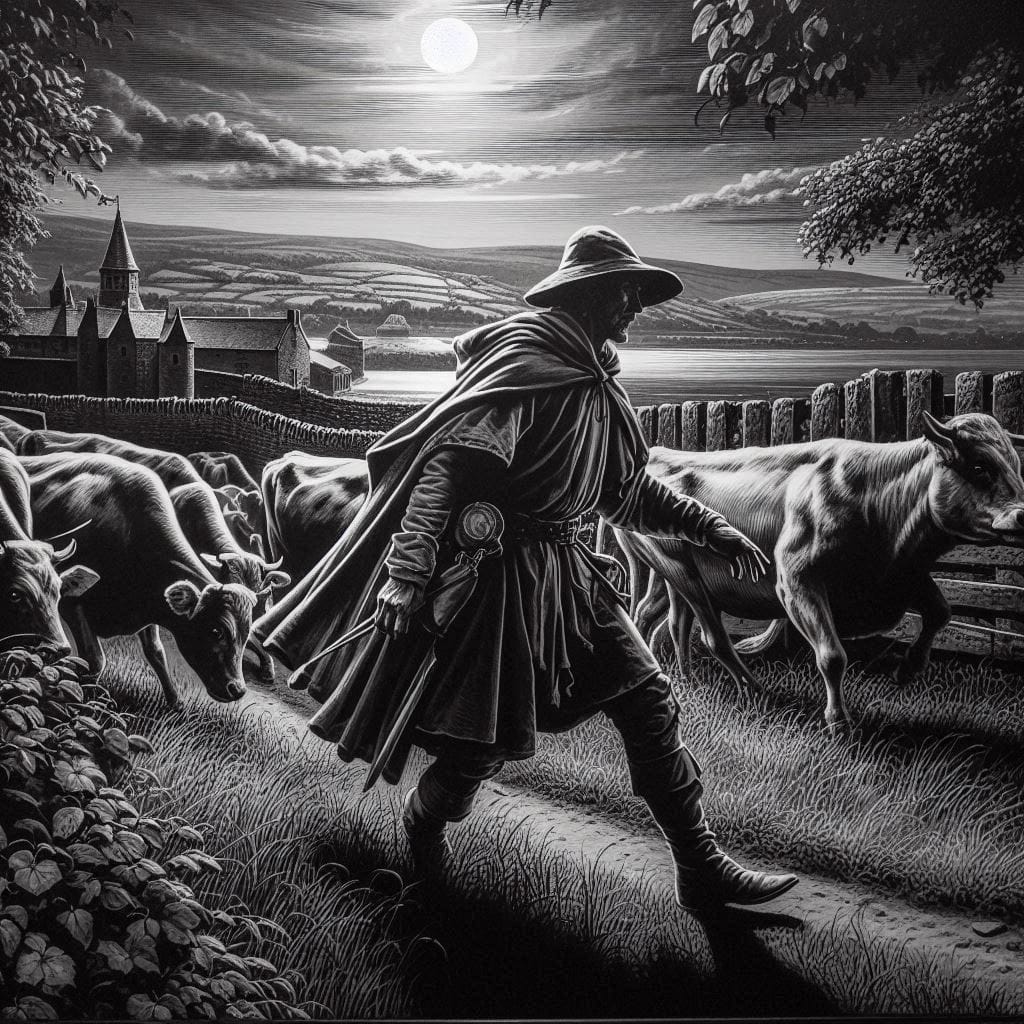
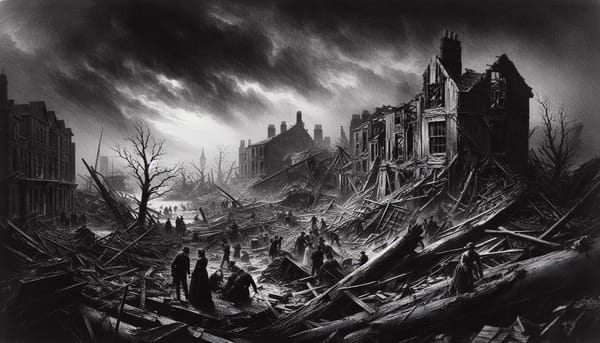
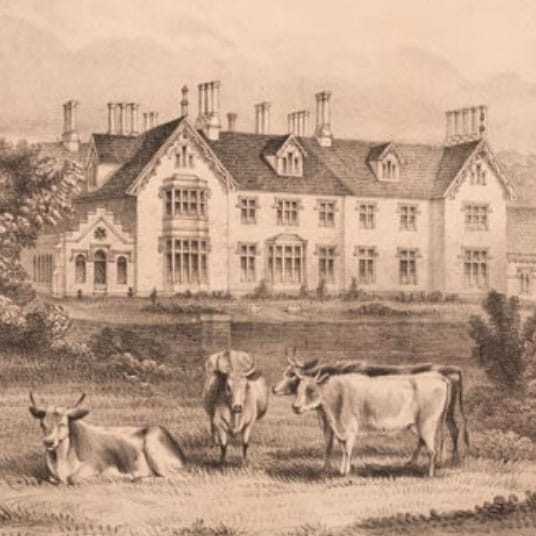

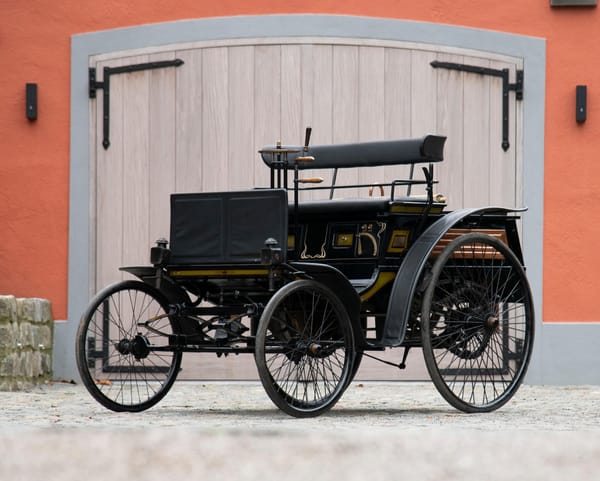
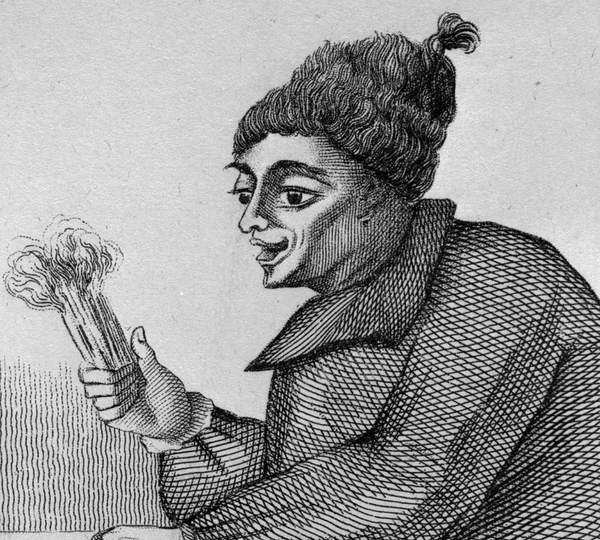
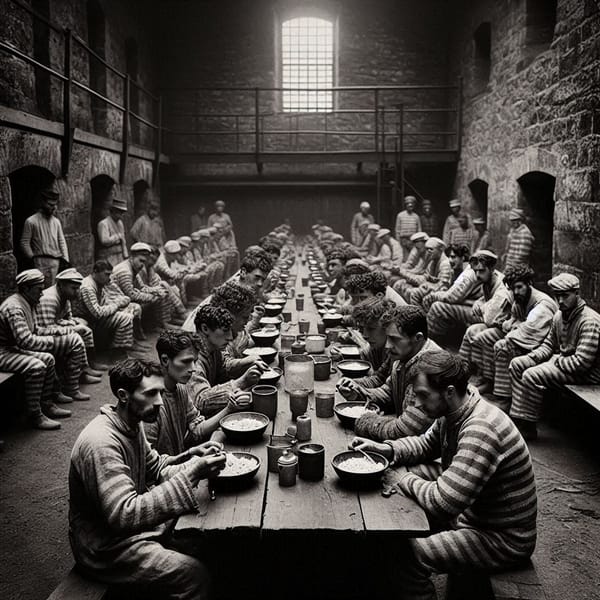
Member discussion